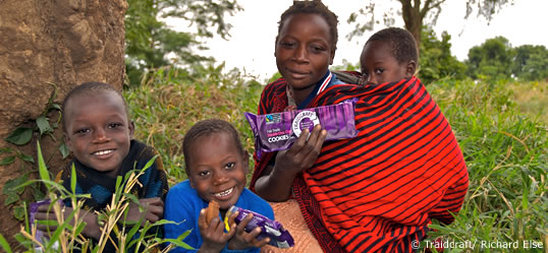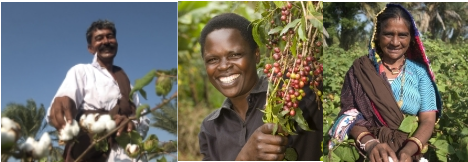What is fair trade?
Fair trade seeks to transform the lives of poor producers in the developing world by enabling them to use their skills and resources to trade their way out of poverty.
Fair trade seeks to transform the lives of poor producers in the developing world by enabling them to use their skills and resources to trade their way out of poverty.
It seeks to challenge injustices in trading structures and practices that so often lead to the exploitation and marginalisation of poor people. Key elements of fair trade-
Fair trade sets out to:
• create opportunities for poor producers
• ensure trading practices are fair, both in terms of payment and prices
• ensure that children are not being exploited
• ensure there is no discrimination
• ensure working conditions are safe.
About Fair Trade
Fair Trade in Europe started as a grassroots movement about 40 years ago. The aim was to alleviate poverty in the 'Global South' - Africa, Asia, Latin America, the Caribbean - by building direct, sustainable relationships with disadvantaged producers and providing fair access to markets in the developed 'North'. The aims are the same now, but Fair Trade has developed into a powerful force, symbolised by a high level of European co-operation. Fair Trade is a trading partnership, based on dialogue, transparency and respect, which seeks greater equity in international trade. It contributes to sustainable development by offering better trading conditions to, and securing the rights of, marginalized producers and workers - especially in the South. Fair Trade organisations (backed by consumers) are engaged actively in supporting producers, awareness raising and in campaigning for changes in the rules and practices of conventional international trade. All involved in Fair Trade accept that it has to include: paying fair prices to producers which reflect the true cost of production, supporting producer organisations in their social and environmental projects, promoting gender equality in pay and working conditions, advising on product development to increase access to markets, committing to long term relationships to provide stability and security and campaigning to highlight the unequal system of world trade which places profit above human rights and threatens our environment.
Fair trade sets out to:
• create opportunities for poor producers
• ensure trading practices are fair, both in terms of payment and prices
• ensure that children are not being exploited
• ensure there is no discrimination
• ensure working conditions are safe.
About Fair Trade
Fair Trade in Europe started as a grassroots movement about 40 years ago. The aim was to alleviate poverty in the 'Global South' - Africa, Asia, Latin America, the Caribbean - by building direct, sustainable relationships with disadvantaged producers and providing fair access to markets in the developed 'North'. The aims are the same now, but Fair Trade has developed into a powerful force, symbolised by a high level of European co-operation. Fair Trade is a trading partnership, based on dialogue, transparency and respect, which seeks greater equity in international trade. It contributes to sustainable development by offering better trading conditions to, and securing the rights of, marginalized producers and workers - especially in the South. Fair Trade organisations (backed by consumers) are engaged actively in supporting producers, awareness raising and in campaigning for changes in the rules and practices of conventional international trade. All involved in Fair Trade accept that it has to include: paying fair prices to producers which reflect the true cost of production, supporting producer organisations in their social and environmental projects, promoting gender equality in pay and working conditions, advising on product development to increase access to markets, committing to long term relationships to provide stability and security and campaigning to highlight the unequal system of world trade which places profit above human rights and threatens our environment.
Why do some products claim to be “fair trade’’ but do not carry the FAIRTRADE Mark?
Some organisations, also called Alternative Trading Organisations (ATOs), are purely dedicated to trading fairly and have been doing so for many years before Fairtrade certification was established. You can find these organisations listed at WFTOor BAFTS. The process of agreeing international Fairtrade standards can take time, and for many of the products these organisations sell, there may not yet be standards available to certify their products. Most products carrying the FLO mark are foods/commodities like coffee, tea etc where it is very simple to apply a standard certification process.
Why aren’t handcrafts Fairtrade certified?
Fairtrade Certification and its system of minimum pricing were designed initially for commodity products. It is technically difficult to adapt this model of standardised minimum pricing to crafts and other products made by small-scale artisans, which are each unique, made of varied materials and have highly varied production processes and costs. However, FLO is currently working with others to explore whether we could work towards a certification programme for these products in the future.


